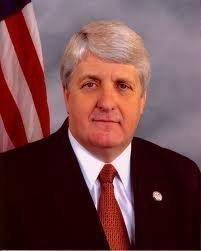Next week, the House of Representatives will consider theConservation and Economic Growth Act, a package of 14 Natural Resources Committee bills.В Among the bills included in the package is the National Security and Federal Lands Protection Act [H.R. 1505], sponsored by National Parks, Forests, and Public Lands Subcommittee Chairman Rob Bishop (UT-01).В
Congressman Bishop will offer anВ amendment on the House floor to make final adjustments and improvements to the existing bill text.В The amendment will:
- Clarify that federal land management agencies may not prohibit border patrol efforts to “prevent all unlawful entries into the United States, including entries by terrorists, other unlawful aliens, instruments of terrorism, narcotics, and other contraband through the international land borders of the United States.”
- Narrow the list of laws that may be waived by the U.S. Border Patrol from 36 to 16.В The original 36 laws were the same laws waived by the Department of Homeland Security (DHS) to construct portions of the border fence.
- Specifically prohibit any additional access to private property.В The bill is written with specific intent to eliminate the possibility of border patrol reducing public access toВ federal land, including: hunting, fishing, and off-highway vehicle (OHV) use.
- Add a provision to ensure and protect tribal sovereignty, stating that nothing in the bill may supersede, replace, negate, or diminish treaties or agreements with Indian tribes.В Existing practices of negotiation and cooperation between the border patrol and Indian tribes must continue.
Restricted access on public lands
The National Security and Federal Lands Protection Act indentifies 20.7 million acres of Department of Interior (DOI) and U.S. Forest Service (USFS) land as some of the most highly trafficked areas used by cartels to transport drugs and humans into the United States. Currently, the U.S. Border Patrol has limited access to certain parts of this region due to a host of restrictive federal land management policies. In some cases, Border Patrol agents may only enter certain areas by foot or on horseback, which, as Department of Homeland Security Secretary Janet Napolitano stated in a letter to Rep. Bishop, “can be inadvisable.” Congressman Bishop’s bill would enable the Border Patrol to waive certain restrictions when access is deemed necessary to the fulfillment of their mission.
In a letter to Congressman Bishop, Secretary Napolitano outlined concerns over the Border Patrol’s limited access: “The USBP, in accordance with the 2006 MOU, makes every reasonable effort to use the least impacting means of transportation within wilderness; however along the southwest border it can be detrimental to the most effective accomplishment of the mission. For example, it may be inadvisable for officer safety to wait for the arrival of horses for pursuit purposes, or to attempt to apprehend smuggling vehicles within wilderness with a less capable form of transportation.”
В
Damage to the environment
The Arizona Department of Environmental Quality estimates that those entering the U.S. illegally leave behind close to 2,000 tons of trash every year in Arizona alone.
“Cartels have figured out that Border Patrol agents are restricted from accessing certain areas. It’s no secret that federal lands give them the strategic ability to evade detection and apprehension. The rationale associated with keeping the Border Patrol out of these areas is actually self defeating. Drug traffickers couldn’t care less about environmental sensitivities, evidenced by the vandalism and environmental destruction they leave behind,” said Congressman Bishop.  “As Secretary Napolitano noted in her letter, the removal of these criminals from our public lands is a value to the environment as well as the mission of the land managers.”
On page 8 of Secretary Napolitano’s letter, she states that, “Overall, the removal of cross-border violators from public lands is a value to the environment as well as to the mission of the land managers. The USBP believes that operations are generally functionally equivalent to mitigation.”
Violence against women
The cartel operations not only bring drugs into the U.S., but also those looking to circumvent the legal immigration process. Many of the women who pay cartels for passage into the U.S. are abused along the way and raped on U.S. soil as final payment. Evidence of these brutal and violent acts can be found across federal land, with undergarments left hanging from trees by cartel operatives as trophies of their deeds. These are commonly referred to as “rape trees.”
“It is unacceptable that this type of violence against women is occurring on federal lands. By giving the Border Patrol greater access to the entire border region, we will cut off access to routes, which will ultimately help prevent further crimes from occurring,” Bishop added.В
Misleading portrayal of the current situation
Some federal lands located throughout the border region are so heavily trafficked by drug cartels that visitors are advised not to enter. Recently, a section of Organ Pipe Cactus National Monument was opened to visitors, however they must be accompanied by anВ armed escort.
“We have all heard the current Administration tout that the border is more secure than ever before. How they arrive at this conclusion remains a mystery given that, without access to the entire border region including all public lands, we can never truly be sure how many people manage to enter illegally and manage to completely evade detection. We know drug and human trafficking continues to occur on federal land, the trails leading in the upwards of 100 miles north of the border speak for themselves. The only way we are ever going to reach our goal of having a truly secure border is by allowing the Border Patrol to access and patrol the federal property where the incursions occur. This legislation is an important first step toward that goal,” said Bishop.

